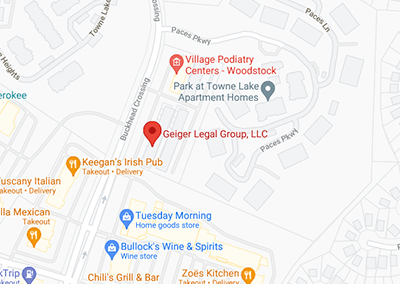The Psychological Impact of Car Accidents: How to Cope and Move Forward

Car accidents can cause various kinds of physical injuries. But can a car accident affect your mental health as well?
The shock of a crash and the physical injuries you suffer can have significant psychological effects. You might feel shock, anger, and anxiety immediately after a car accident. Long-term, you may develop sadness or depression over injuries and disabilities you suffered due to the crash. The trauma of a car accident may also cause you to develop mental health issues such as severe depression, irrational fears, and PTSD.
Building a support network of family, friends, and healthcare professionals can assist you with your recovery. A compassionate car accident attorney from Geiger Legal Group, LLC, can help you pursue compensation for financial and personal losses you suffer due to the psychological impact of a car accident.
Contact us now for a free consultation with an experienced Georgia car accident attorney.
Understanding the Psychological Impact of Car Accidents
You might wonder how a car accident can affect your mental health. The shock of getting into a crash can cause psychological impacts like fear, anger, guilt, and a fight-or-flight response. Even if you seem emotionally well after a car accident, you may begin to develop mental health issues such as post-traumatic stress disorder (PTSD), survivor’s guilt, and clinical depression. Some crash survivors turn to drug or alcohol use to self-medicate their mental anguish.
The physical injuries you suffer following a car accident can also have psychological consequences. When your injuries result in disabilities or disfigurement, you may become anxious or depressed over your inability to perform daily tasks, participate in activities you previously enjoyed, or over changes to your appearance from scarring and disfigurement.
Some physical injuries also frequently have mental components. For example, a traumatic brain injury (TBI) often affects the injured person’s mood, personality, cognition, and other mental processes.
Early Signs and Symptoms to Recognize
You or your loved ones may notice a decline in your emotional and mental health after a car accident. Some of the signs of psychological distress caused by a car accident include:
- Loss of enjoyment or interest in your regular activities
- Mood swings
- Extreme anger, sadness, guilt, or other powerful emotions
- Irritability and sudden, unexplained outbursts
- Increased stress, excessive worry, and persistent anxiety
- Sleep disturbances, including insomnia and difficulty staying asleep
- Flashbacks and nightmares about the accident
- Depression
- Withdrawal from family, friends, or social activities in day-to-day life
- Loss of appetite or digestive issues
- Irrational fears of going out or driving or riding in a car
- Avoiding stimuli that remind you of the accident, such as avoiding getting into cars or going past the crash site
- Feelings of hopelessness
- Self-harm or risk-taking behavior
- Suicidal thoughts
It is critical to seek professional help to deal with psychological disorders in the wake of an auto accident.
Coping Mechanisms and Strategies
When you struggle with the effects of mental trauma and emotional distress after a traumatic event like a car crash, you may have various options to help you cope and begin to heal. The following coping strategies for the psychological impacts of a car crash could help:
- Talk about your feelings with your loved ones and your healthcare providers. Your family members and friends can help you address some of the effects of your mental trauma, such as encouraging you to reengage with social activities. A mental health professional can also direct you to therapies or treatments for mental health conditions like severe depression, anxiety, and PTSD.
- Stay engaged in daily tasks, work duties, and exercise routines. Your doctor can help you remain active while recovering from physical injuries suffered in the car crash.
- Practice wellness and self-care. Exercise regularly (within your physical limits), eat nutritiously, get plenty of quality sleep, and consider improving or maintaining your mental health through meditation, yoga, breathing exercises, and so on.
- Recognize triggers that harm your mental health and develop a plan to avoid or cope with them as necessary.
- Practice defensive driving and other safe driving behaviors, which can help you feel safer in a vehicle and rebuild your confidence behind the wheel.
Navigating the Legal Process with Compassion
When mental trauma from a car accident causes financial and personal losses, you may have the right to pursue a legal claim to recover compensation for those losses from the driver or other parties liable for the crash. Financial recovery for the psychological impacts you’ve experienced due to a car accident may include money for:
- Medical treatment for physical symptoms, such as insomnia or digestive issues
- Mental health treatment, including doctor’s appointments, mental health therapist appointments, and medications like anti-depressants and anti-anxiety drugs
- Loss of income for time you need to take off from work while emotionally recovering from the accident
- Emotional trauma and distress
- Loss of enjoyment and quality of life
- Pain and suffering
Building a Support Network
Having a support network can make the emotional recovery process much more manageable after suffering mental trauma due to a car accident. Your support network may include:
- Family members, members of your household, and friends who can watch out for signs of declining mental health, help you around the house as you heal, or encourage you to resume social activities or undertake self-care
- Your primary care physician, who can direct you to mental health providers or recommend medications needed to treat severe issues
- A mental health therapist who can assist with your recovery through talk therapy
- Support groups dedicated to car accident victims that can provide you the opportunity to talk with others who have gone through the same emotional trauma as you
Moving Forward: Life After a Motor Vehicle Accident
Following a traumatic car accident, you should familiarize yourself with what to do after a car accident for your mental health, such as:
- Building a support network to help you cope with the psychological impacts of the crash and begin the process of emotional healing
- Talking to your primary care physician, who can recommend whether you may need mental health therapy or other treatments to cope with your emotional trauma or distress
- Finding a therapist whom you can talk to about your feelings and who can guide you through the process of mental health recovery
- Resuming your pre-accident activities and routines
Contact Our Georgia Car Accident Attorneys to Learn More
When you’ve suffered adverse effects on your mental health after a car accident, you need legal help to pursue compensation and justice from those responsible for the crash. Contact Geiger Legal Group, LLC, today for a free, no-obligation consultation to discuss your legal options for obtaining a financial recovery with the assistance of our Georgia car accident attorneys.



































